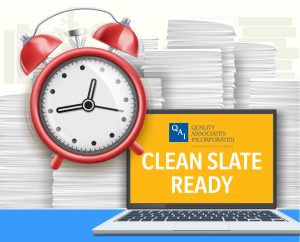Implementing a Clean Slate initiative isn’t just about passing legislation—it’s about execution. For municipal courts and law enforcement agencies, that means preparing to automatically expunge eligible criminal records. The stakes are high, and the timeline is tight.
Clean Slate laws are already in effect across several U.S. states—including California, Colorado, Connecticut, Delaware, the District of Columbia, Michigan, Minnesota, New Jersey, New York, Oklahoma, Pennsylvania, Illinois, Utah, and Virginia—reflecting a growing national commitment to automatic record clearance. As more jurisdictions prepare to follow suit, municipal courts and law enforcement agencies must take proactive steps now to ensure compliance, data readiness, and seamless implementation.
Successful implementation depends on your agency’s ability to execute the law effectively through accurate data, digitized records, and integrated systems. Here’s how to get started:
1. Audit Your Criminal Justice Data—It’s Worse Than You Think
Clean Slate laws require automatic identification of eligible individuals by cross-referencing data from courts, police departments, prosecutors, and corrections. If your arrest records, case dispositions, or sentencing data are incomplete, inconsistent, or siloed, you won’t be able to make accurate eligibility determinations. Start auditing now. Identify gaps in arrest logs, missing case outcomes, and outdated formats. This foundational work is critical.
2. Digitize Your Backfile—Paper and Microfilm Won’t Cut It
Many municipal courts and police departments still rely on paper case files or microfilm archives. Clean Slate implementation demands digital access to decades-old records. Professional backfile conversion ensures high-quality scans, searchable indexing, and metadata tagging. Don’t rely on a part-time clerk with a desktop scanner—invest in high-capacity, experienced digitization solutions to avoid costly errors and delays.
3. Choose a Long-Term Digital Preservation Solution
You’re not just digitizing records for today—you’re building a trusted digital archive for decades. Law enforcement and court records must remain authentic, accessible, and secure. Standard IT backup systems aren’t enough. You need digital preservation tools that guard against file format obsolescence, data corruption, and unauthorized access. Think long-term: what happens when you need to retrieve a sealed record ten years from now?
4. Treat Clean Slate as a Systems Integration Challenge
This isn’t just a policy shift—it’s a technical one. Your agency’s case management systems, records management platforms, scanning equipment, and digital archives must work together. Seamless integration is essential to automate sealing and ensure compliance. A third-party provider with deep technical expertise in digitization, records management, and systems integration at scale can support Clean Slate implementation effectively.
5. Partner with Experts for End-to-End Accountability
Avoid the chaos of managing multiple vendors. A single-source provider who understands municipal court operations and law enforcement data can streamline scanning, software deployment, integration, and support. Look for partners familiar with CJIS compliance, FADGI standards, and the realities of public sector project management.
Bottom Line
Clean Slate laws require agencies to modernize how they manage and process criminal records. For municipal courts and law enforcement, success depends on preparation, digitization, and systems integration. Start now by improving data quality, converting legacy records, and ensuring your systems can support automated record sealing. Effective execution is essential to meet legal obligations and serve your community reliably.


